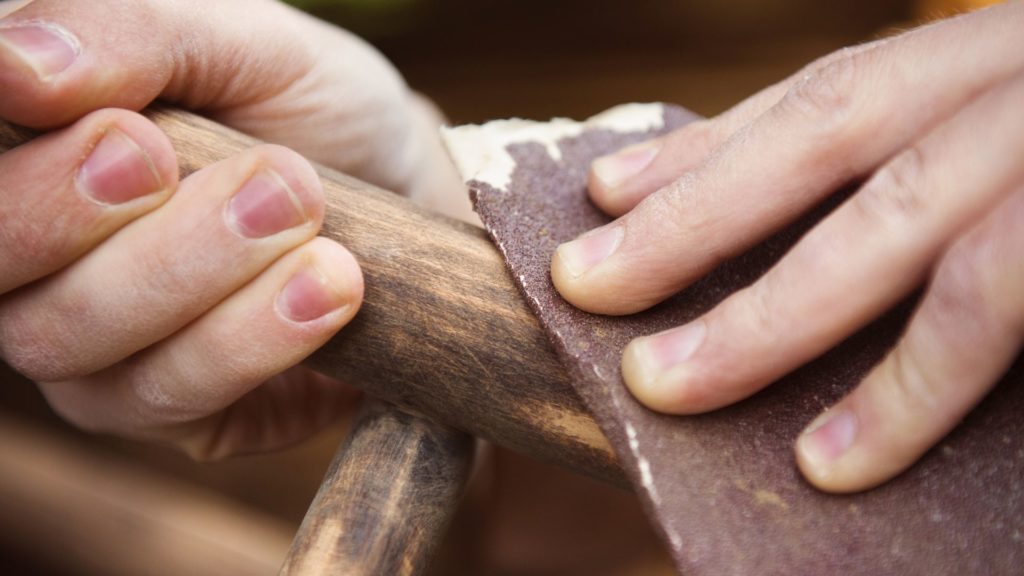For many Do-It-Youselfers, restoring old furniture is a delightful hobby, full of creative design and hard work that offers satisfying rewards. Somehow, those creative types see a battered, and often broken, piece of furniture not as it is but as it could be. Restoration is not a question for them but a determined vision.
Those of us facing sexual betrayal hear the word restoration often, yet it feels elusive or like an impossible DIY project with which we have no idea where to start. For a moment, let’s consider our situation like old beaten-up furniture in need of a major overhaul. The good news is Jesus, the ultimate redeemer and restorer of broken things is our teacher, our master carpenter, and designer. Often we believe restoration of our relationship should take priority, yet He knows we must be restored as individuals first.
For a little help understanding the restoration process, let’s go to an expert. On their website, Home Depot suggests the following steps for the restoration process, which coordinate well with the restoration God wants to do in us.
Step 1: Clean. Any refinishing furniture DIY starts with basic cleaning.
As a DIYer cleans a piece of furniture she is planning to restore, she must accept the piece as it is. This is one of the first steps in restoration for women facing sexual betrayal. This acceptance isn’t resignation but a grieving of what has been lost. Although we wish this wasn’t our story, we can grieve the loss of the stories we wanted or thought we were living. Grieving enables us to see what we have and where we are, clearing away denial so the Lord can begin the work.
Step 2: Examine. Take an overall assessment of the piece and determine if it needs any repairs.
For betrayed partners, this looks like taking a hard look at some difficult truths not only about our marriage but ourselves as well. What lies have we believed about our identity in Christ? What habits have we let creep in that push God out? What doubts about God have we let control our relationship with Him? God does not waste anything and when we face truth within ourselves, He will turn those broken things into gold!
Step 3: Remove old finish. Removing the old finish is the most time-consuming part of refinishing wood furniture.
Betrayal trauma brings pain in every area of our lives: emotional, mental, spiritual, and physical. So many times, I wanted this part of my life story to just be over. I wanted to move on. Surely, I’d learned and grown enough in all my relationships. Sound familiar? Like removing old finish on furniture, this restoration stage may take a while. God doesn’t desire that we “live in pain” but our human bodies go through a lot when traumatized. We must find our comfort in these truths:
- God is close to the brokenhearted – Psalms 34:18
- God bandages our wounds – Psalm 147:3
- You will be comforted – Matthew 5:4
- You are not alone – Deuteronomy 31:8-9, Isaiah 43:1-2
- God sees and bottles each tear – Psalms 56:8
God will not leave us in our pain. Philippians 1:6 tells us “…be confident in this, He who began a good work in you will carry it on to completion.” Let’s keep looking up; night won’t last forever.
Step 4: Sanding. Sandpaper does an effective job of removing varnish or paint.
The sandpaper and surface of the wood work together to restore. One pushes the other so that rough edges are smoothed out. Reminds me of the verse in Proverbs about iron sharpening iron. As a “project piece,” we must find a community to be our sandpaper, the kind that smooths out our rough edges. God loves to use others to help us grow. Such shame surrounds the story of a betrayed woman, we can easily isolate. However, when we risk living vulnerably in community, we find understanding, support, encouragement, and validation. As an added bonus, God uses us as “restoring sandpaper” for another. If we let it, community can add unexpected beauty to our stories and fuel our healing with friendship.
Step 5. Seal the wood. Sealant protects wood furniture.
Protecting ourselves emotionally should be a natural part of our lives. Unfortunately, many, if not most of us, lack the skills needed to do so. Learning to set boundaries is an important part of the restoration process. (Lyschel defines boundaries “as a healthy understanding of where I end and you begin; knowing what’s mine, yours, and God’s.”) Establishing them can be the sealant that protects our hearts and will be an essential part of the healing process. Proverbs 4:23 tells us to guard our hearts. As we heal, we will need to establish and uphold boundaries with our spouse, others, and even ourselves to stay on the path to restoration. (If you need help understanding and setting boundaries, check out the Hope Redefined Boundaries Support Group.)
Step 6: Apply Finish. Finishes protect your furniture from damage and accentuate the wood’s beauty.
Up to this point in the restoration process, we’ve gained some eye- and heart-opening understandings of both ourselves and God. Here is where we let those revelations grow stronger. Restoring our heart requires that we replace soul blemishes, chipped emotions, mental divots with God’s word. We exchange old beliefs for His truths. We anchor our identities in who God says we are. This not only prevents damage to our relationship with God but also brings out the beauty of our lives to others. People will hear our stories and wonder why our hearts aren’t destroyed and how we are still standing. We can point straight to God as our restorer and his work is never flawed.
Restoring You, Restoring Your Relationship
The surprising part of this journey that so many women experience is how much restoration God does within them completely apart from their marriage. Once we start digging in and getting honest with God and vulnerably showing up in community, the restoration process begins. God is not afraid of our state of disrepair, whether it be marred in anger, chipped with confusion, dusty with distrust, or cracked with brokenness. You, nor your marriage, is a Do-It-Yourself restoration project. God desires to take both through the process, and He can. His speciality is broken into beautiful whether it’s your heart or your relationship.
A Fellow Hope Wrangler,
Alicia

